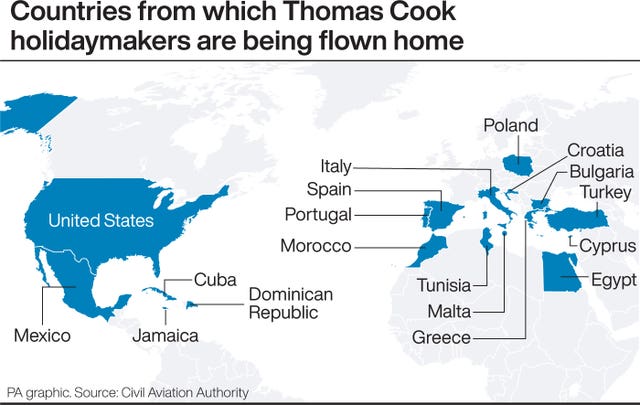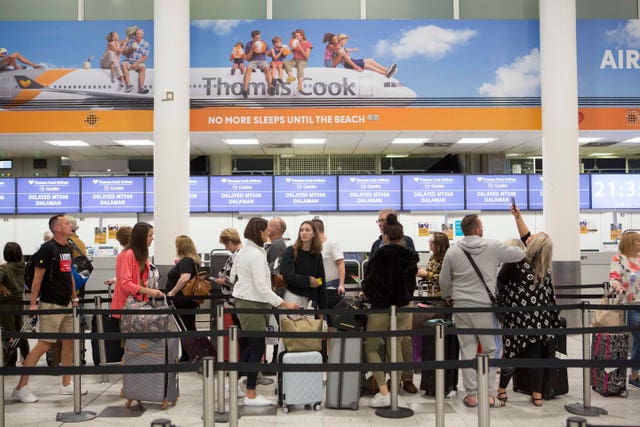Major repatriation launched after Thomas Cook collapses
An estimated 150,000 tourists are being brought home by the Civil Aviation Authority.

The UK’s largest peacetime repatriation has been launched after travel giant Thomas Cook collapsed.
An estimated 150,000 tourists are being brought home by the Civil Aviation Authority (CAA) in a flight programme costing £100 million.
Thomas Cook ceased trading in the early hours of Monday morning after failing to secure a last-ditch rescue deal.
Holidaymakers already abroad will be flown home as close as possible to their original return time and date.
All future Thomas Cook bookings have been cancelled, affecting around one million people.
Among those suffering disrupted are Lewis and Amy Bromiley from Manchester, who have paid £7,000 for a honeymoon in the Maldives in January.
Mr Bromiley, 25, told the PA news agency: “Me and my wife are devastated.”

He added: “We’ll have to wait for the refund which could takes months.”
Lucy Jessop from Hull was due to return from a two-week holiday in Mexico on a Thomas Cook flight on Tuesday.
She said she was “initially worried” about the situation but was relieved that alternative flights are being arranged.
“It’s the employees of Thomas Cook and all those due to go on holiday I feel for,” she added. “We were the lucky ones, I suppose.”
Richard Moriarty, the chief executive of the CAA, said the Government had asked his organisation to launch “the UK’s largest ever peacetime repatriation” which will involve flights from 53 airports in 18 countries.
Around 40 aircraft from as far away as Malaysia have been chartered to operate approximately 1,000 flights over the next two weeks.
Most of the flights will be from European airports, but customers will also be brought home from Thomas Cook’s long-haul destinations such as those in the US, the Caribbean and Cuba.
The first repatriation flight departed New York for Manchester with more than 300 passengers on board at 9.40am (BST). It is estimated to land at 5pm.
The majority of the £100 million cost of the programme will be met from funds held by the Atol scheme, with the Government also making a contribution.
Atol provides protection to customers on package holidays when travel firms collapse, although passengers who made flight-only bookings with Thomas Cook are also being brought home at no extra charge.
Thomas Cook package holiday customers will also see the cost of their accommodation covered by Atol.
Those who have not yet started their package holiday will be given a refund, while those on flight-only bookings are advised to seek reimbursement from their credit or debit card provider, or make a claim through their travel insurer.
Thomas Cook was unable to secure the extra £200 million needed to keep the business afloat following a full day of crucial talks with its major shareholder and creditors on Sunday.
Unions representing its staff, of which there are 9,000 across the group in the UK, had previously urged the Government to intervene financially.
Thomas Cook chief executive Peter Fankhauser said his company had “worked exhaustively” to salvage a rescue package.
He said: “I know that this outcome will be devastating to many people and will cause a lot of anxiety, stress and disruption.
“I would like to apologise to our millions of customers, and thousands of employees, suppliers and partners who have supported us for many years.”

One of the world’s oldest and largest travel companies, the firm had been trading for 178 years – having been established in 1841 by a cabinet maker who organised a day trip for temperance movement supporters.
As of this year the group employed 21,000 people in 16 countries, operated 105 aircraft and 200 own-brand hotels and resorts.
Thomas Cook customers are advised to visit the CAA’s dedicated website, thomascook.caa.co.uk, for more information about what they should do next.





